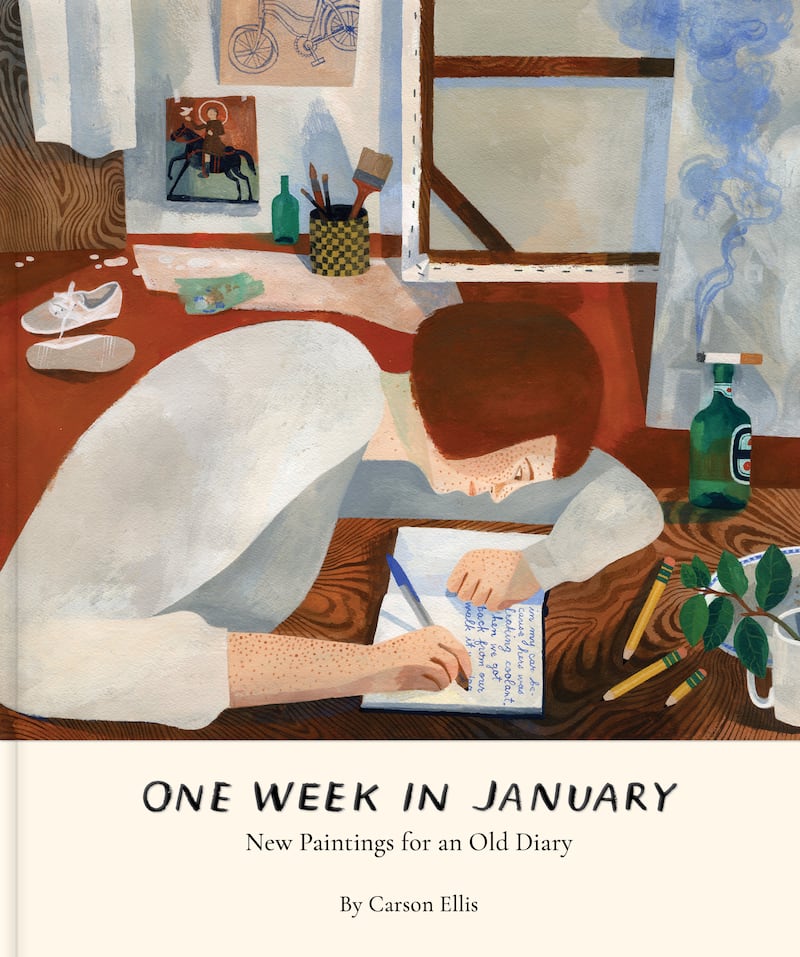In January 2001, author and illustrator Carson Ellis was 25 years old and living illegally in a Central Eastside warehouse with a bunch of other artists. She had just moved to Portland from San Francisco and was surviving on meager savings and leftover pizza. In a quarter-life crisis of sorts, Ellis decided she was too forgetful and needed to take up journaling.
This resulted in exactly eight typed pages documenting a single week in 2001. And those eight pages form the basis of One Week in January: New Paintings for an Old Diary. (Chronicle Books, 80 pages, $22.95) available Sept. 10. It’s Ellis’ adult debut after a career spent largely writing and illustrating children’s books.
There wasn’t a ton to document in Ellis’ 2001 la vie bohème. During her first week in Portland, she smokes countless cigarettes, struggles to get a line set up with the phone company, paints, listens to Napster, and bickers with, but also snuggles, a roommate named Colin Meloy. He is starting to gain traction with his new band The Decemberists.
Ellis found the long-forgotten diary (her memory has not improved) in a crate of letters and keepsakes a few years ago. She illustrated the journal in gouache on watercolor paper with scenes such as lunch at Dots Cafe on Southeast Clinton Street, hiking in Forest Park, storm clouds over the now-demolished Portland Meadows racetrack, and self-portraits with lots of freckles.
We spoke to Ellis, 48, about becoming an artist in the pre-digital era, chain smoking, and how the Mister is handling the uncharitable depiction of him in the book.

WW: How did this book come about?
Carson Ellis: I read it, and it was funny, and I read it to my husband, and he thought it was funny. And then it kind of like stuck with me for a few days and I kept thinking about it. I couldn’t tell if it was the kind of thing that the broader world would have any interest in. And, honestly, I’m still wondering.
Whom do you think it will resonate with?
I think for people my age who are sort of nostalgic for that pre-digital world. I didn’t have a cellphone when I wrote this journal. People are, sort of, missing that a little. I think we’re finally far enough away from it to have some perspective. That moment in the early 2000s we were making a massive cultural shift into a total digital world, and we didn’t know how radical and how irreversible it would be. I think a lot of us are pining for that time.
Could this version of an artist’s life happen in Portland now?
Well, I don’t think it’s cheap here anymore, so I don’t know. When I moved to Portland in 2001, I didn’t come with very much money. But I also managed to sort of do nothing and be unemployed for a pretty long time. I think I did that for about a month. And then when I did get a job, it was bartending and I worked short shifts. I had so much leisure time and my rent was so cheap.
Where was the warehouse?
I’m hesitant to say, but maybe that’s silly. It was illegal to live there, and we were always worried about getting kicked out. A fire inspector would come through and we’d have like 24 hours’ warning. Everyone would move all their bedding into the basement of the building, and we would like transform our homes into workspaces. Like, “This is just my art studio! I don’t live here!” We were so paranoid about getting evicted that I’m still clinging to that paranoia. And I’m protective of whoever is there now.
What would you tell 25-year-old Carson?
I don’t want to advise her because I don’t want anything to turn out differently than it did. I’d maybe be like, “Dude: Quit smoking. Enough.”
When did you quit?
2005, so I was going to chain smoke for four more years. Which is gnarly.
How does Colin feel about his depiction in the book?
He certainly didn’t take issue with it. He thinks it’s funny.
He comes across as pretty prickly.
Yeah, I know. He is. And he was. There’s a lot of resentment, I think, that shines through in my depiction of Colin. Maybe it’s not as clear to readers as it is to me, but I’m just remembering how mad I was at him all the time, and frustrated in the relationship.
In the introduction you say “Colin and I were bickering but inseparable.”
We really were. I moved up here because we just were inseparable, and we were friends from college and it was hard to be apart. But then I came here and it was like, what is this relationship?
Which pizza place did he work at? You don’t name it.
It was American Dream Pizza, which we just read is closing. Colin always talks about how it’s his Plan B, and if The Decemberists can’t make a dime again, he’s going to go get his job back at American Dream. And he just texted me a link to an article about how American Dream is closing after decades and he was like, “Well, there goes Plan B.”
SEE IT: Carson Ellis is in conversation with Colin Meloy at Powell’s City of Books, 1005 W Burnside St., powells.com. 7 pm Tuesday, Sept. 10. Free.
